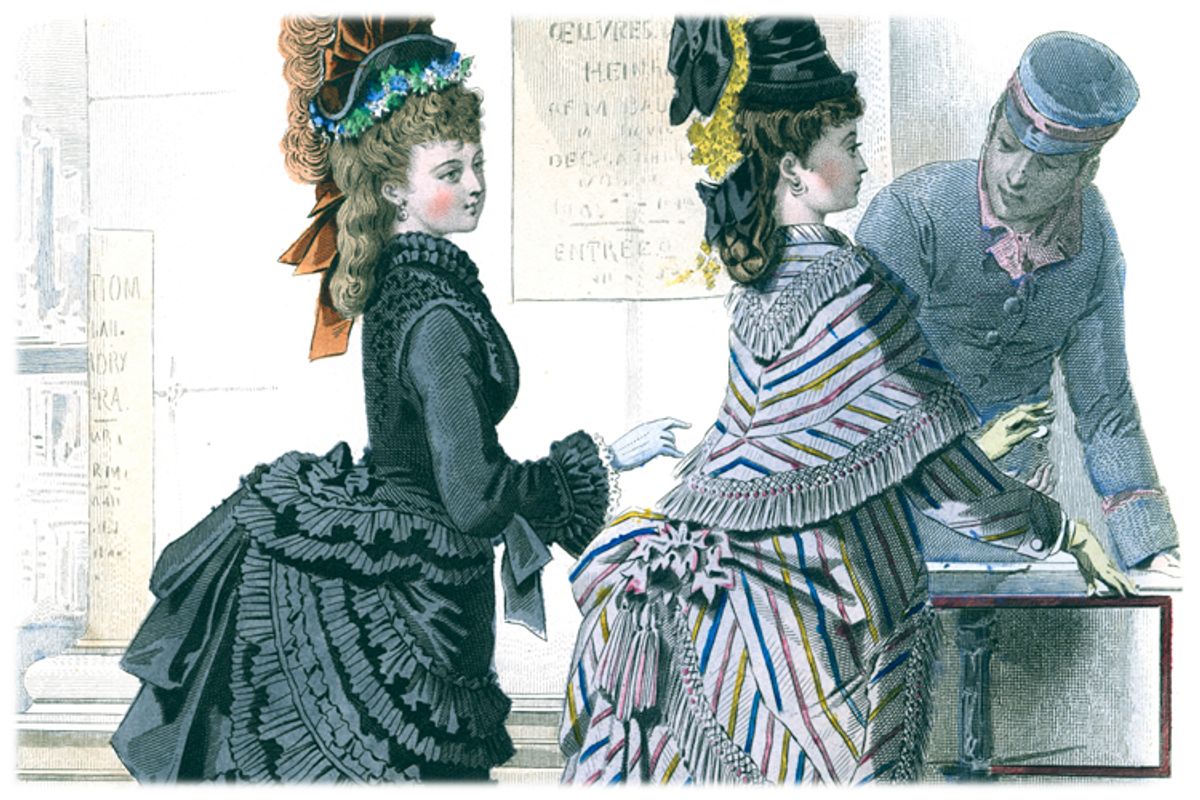"Is this a feminist publication?" asks Bryan Goldberg, the 30 year-old founder of Bustle. "You’re damn right this is a feminist publication." To illustrate this point, in the photograph accompanying his profile in the current New Yorker, Goldberg is pictured using a high-heeled, short-skirted young female colleague as his laptop desk. And the image of Goldberg, surrounded by a total of nine females and one wineglass, lounging on the floor and typing on a Mac perched daintily on a purple-clad female's legs, isn't the only incongruous aspect of Lizzie Widdicombe's fascinating feature on the man "looking to redefine what 'women's interest' looks like."
Bleacher Report co-founder Goldberg raised eyebrows this summer when he announced – in a post he would later admit came across as pretty "pandering" – that he'd raised $6.5 million to start the site he vowed would "completely transform women's publishing." He said at the time, "Most women are completely open to the idea of a man starting a company aimed at women, and hiring a large team of women," and he was likely correct. The idea of a man starting a site for young women – huge, advertiser-friendly demographic that they are – makes entrepreneurial sense for the person launching it and potentially good business sense for the women who work for it. But it was his apparent initial enthusiasm to create something that women hadn't long already been doing that struck a concerning chord. "Yes, we believe that a partner-track attorney can be passionate about world affairs and celebrity gossip," he'd written, as if this had been breaking news. "On the same day. During the same coffee break. And there is nothing wrong with that."
There's a similar air of self-revealing cluelessness that permeates Widdicombe's piece. She introduces Goldberg with his observation that "The schlubbier you are, the more credibility you have" – credibility he seems blissfully unaware is not traditionally extended to females. She sets the scene at Bustle's "newly renovated four-story town house in Williamsburg, Brooklyn … all decorated in a funky flea-market style" like a postmodern TGI Friday's. (You'd think with $6.5 million, they wouldn't have to use the staff members as tables.) She nods to "the Web development team, which is all male" and lands at an editorial meeting, in which Goldberg is, in constrast, "the only man in the room." And in the space of a single feature that Goldberg on Monday described as "a fun read," she reveals the peculiar, seemingly contradictory philosophy of Bustle and its head honcho.
"I am a dude," Goldberg boldy reveals. "I don’t have a lot of overlapping interests with most women my age. I’m really into history. I’m really into markets and finance. I don’t know a damn thing about beauty, but I don’t need to." Yet if that sounds like the statement of a man who assumes women his age aren't "interested" in markets and finance -- and that what he deems women's true interests are somehow beneath him -- that conclusion is upended later when he says that women "understand this industry better than a lot of Wall Street media analysts." But then when you think maybe he's aiming for something meatier, on a site that he insistently "didn’t want pink everywhere," he describes his vision of "a thousand articles a day" on "every topic that young women care about -- all their favorite shows, all their favorite celebrities, all their favorite fashion brands, every news story that’s relevant to them." So, to be clear: Young women care about celebrity, shopping and news, in that order. Later in the piece, he expands on that theme, unflatteringly to both sexes. "If you told nine guys to sit down in a waiting room in a dental office, they’ll probably start talking about sports," he says. "For women, there’s twenty things it could be. 'I like your earrings. Where did you get them?' Or someone sees a People magazine and talks about Amanda Bynes. It could be —someone mentions Zumba, and 'Oh, I’ve been thinking of doing that.'" He adds that "Men, to the best of my knowledge, don’t even read." And he explains the site's name, noting "the common thread between women in the professional world and stay-at-home moms" is that "They’re very busy. There’s always bustle in their lives." He also says, of the word's other, restrictive clothing connotation, "It’s also a type of old-fashioned dress accessory. I did not know that. I know now." On Twitter Monday, Goldberg seemed pleased with the piece, and when Rachel Sklar asked him directly about the bizarre accompanying photo, he genially noted, "Team of professional photographers came to house and staged hundreds of pictures."
In the feature, Goldberg says that he wishes he'd reached out more to "the feminist community," admitting, "Honestly, nothing would have been more helpful here than for some highly regarded feminist writers to say, 'Bryan’s a good person.'" Perhaps if he had, he would have received that "He's a good person" endorsement he currently wishes for. Perhaps not. But it's a good bet someone would have told him it's not a great feminist statement to use a woman's body as a sexy prop in a photo shoot, like it's a Robin Thicke video or something. Yet that image seems to beautifully illustrate the sentiments contained within the feature itself. The women Goldberg surrounds himself with – both as workers and readers – seem to exist to him to reinforce his particular vision of the world, not influence or challenge it. They're just the decoration, like his "vintage globe, watercolor paintings, and mod yellow couch from Macy’s."



Shares